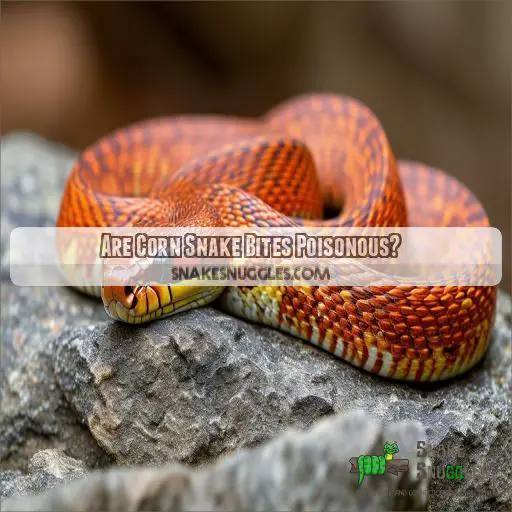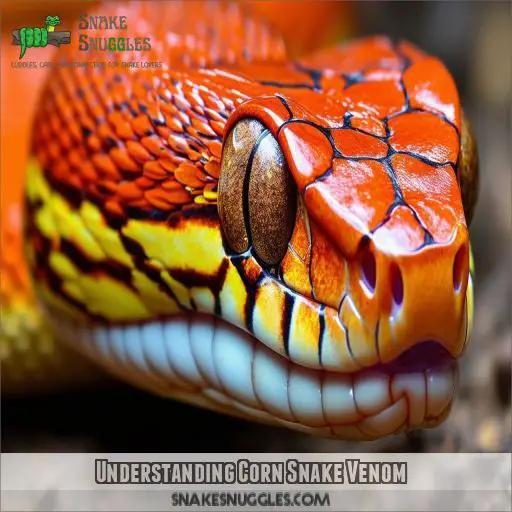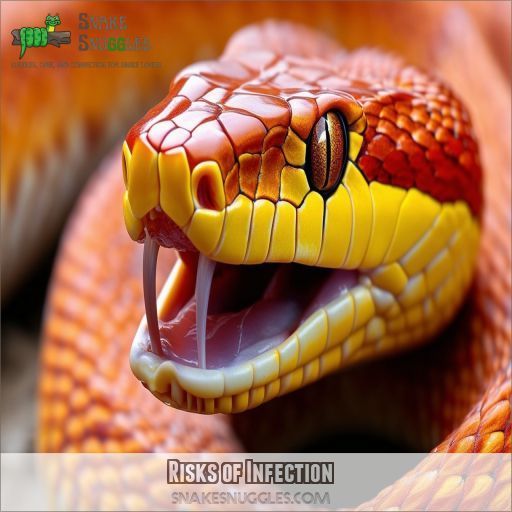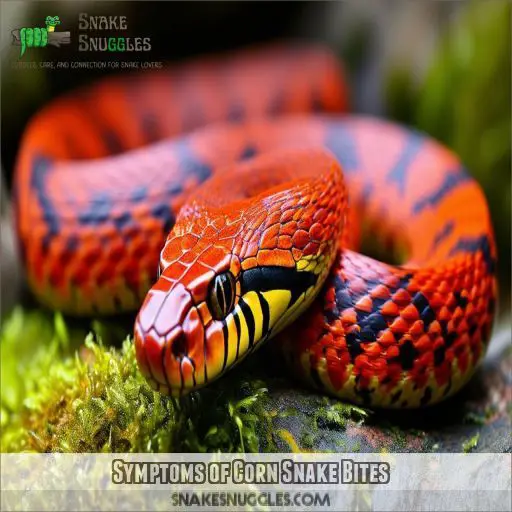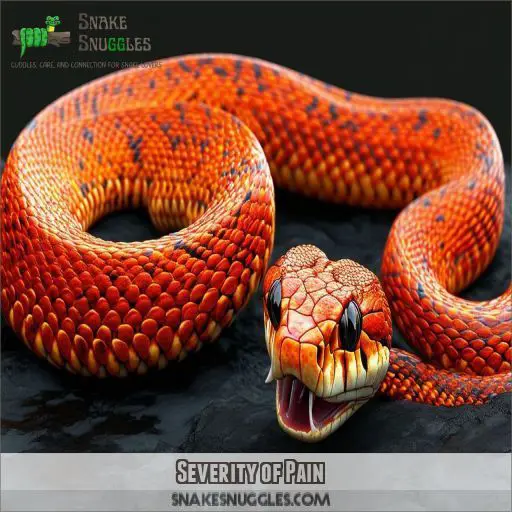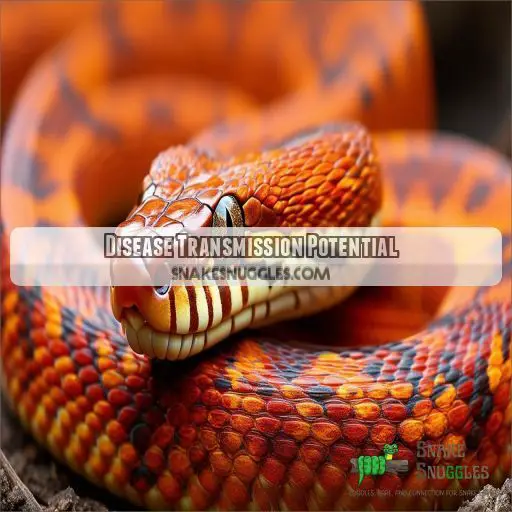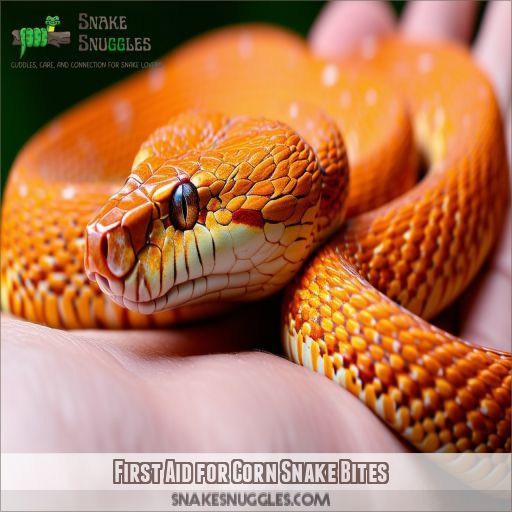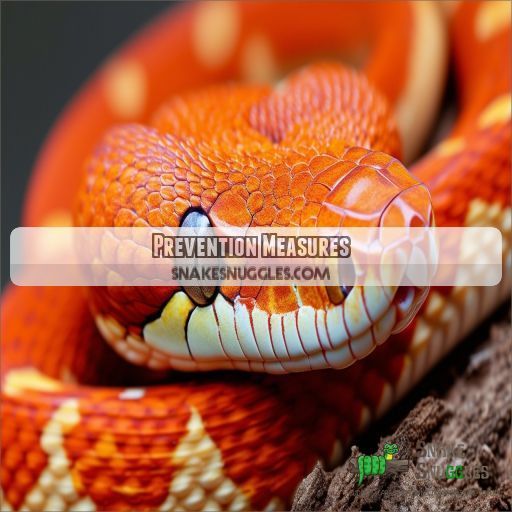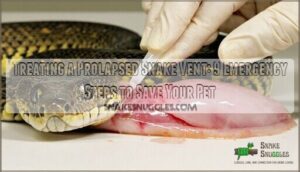This site is supported by our readers. We may earn a commission, at no cost to you, if you purchase through links.
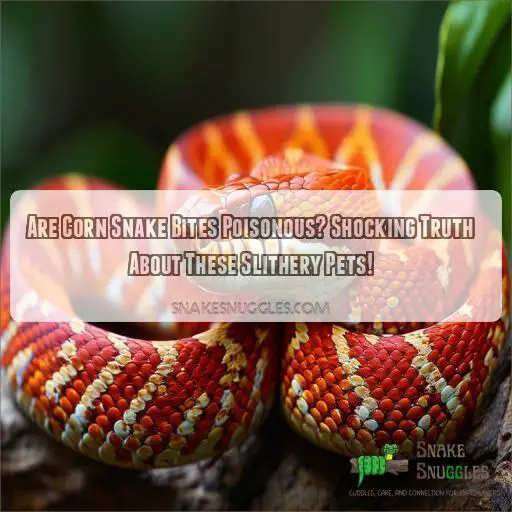 Despite their name, corn snakes aren’t venomous crop pests.
Despite their name, corn snakes aren’t venomous crop pests.
You might wonder, "Are corn snake bites poisonous?" The shocking truth is they’re not.
These popular pet snakes, while capable of biting, don’t possess venom glands. Instead, they’re constrictors that subdue prey by squeezing.
However, their bites can still cause pain and potential infection.
Understanding the risks and proper care for these slithery companions is essential for any reptile enthusiast.
Let’s explore the facts about corn snake bites and their impact on pet owners.
Table Of Contents
- Key Takeaways
- Are Corn Snake Bite Poisonous?
- Are Corn Snake Bites Poisonous?
- Understanding Corn Snake Venom
- Risks of Infection
- Symptoms of Corn Snake Bites
- Severity of Pain
- Tetanus Shot Consideration
- Disease Transmission Potential
- First Aid for Corn Snake Bites
- Prevention Measures
- Frequently Asked Questions (FAQs)
- What to do if bitten by a corn snake?
- Do you need a tetanus shot after a corn snake bite?
- Can you get diseases from corn snakes?
- How bad does a small snake bite hurt?
- How often do corn snakes bite their owners?
- Can corn snake bites cause allergic reactions?
- Do corn snakes become less bitey with age?
- How long does a corn snake bite take to heal?
- Are there any long-term effects from repeated corn snake bites?
- Conclusion
Key Takeaways
- Breathe easy, snake enthusiasts! Corn snakes may have a menacing name, but their bite is all bark and no venom. These slithery friends are about as poisonous as a bowl of cornflakes.
- While corn snake bites won’t turn you into Spider-Man, they can still pack a punch. Think of it as a love nibble from a scaly puppy – it might smart, but it won’t send you to the ER.
- Keep it clean, folks! The real danger from a corn snake bite isn’t poison, but potential infection. Treat that little nip like you would any other boo-boo – soap, water, and maybe a colorful band-aid for good measure.
- Handling your corn snake with care is key to avoiding the chomp. Remember, they’re not auditioning for "Jaws" – most bites happen when these reptiles are feeling stressed or mistaking your finger for a tasty mouse. A calm snake is a happy (and less bitey) snake!
Are Corn Snake Bite Poisonous?
No, corn snake bites aren’t poisonous. These popular pets don’t have venom glands, making their bites relatively harmless.
You might experience mild pain, swelling, and slight bleeding at the bite site, but it’s typically no worse than a cat scratch.
However, don’t let your guard down completely. While not poisonous, corn snake bites can lead to infection if not properly cleaned and cared for.
It’s important to handle these snakes with respect and follow proper hygiene practices. Remember, prevention is key – learn proper handling techniques to minimize bite risks.
There’s more to uncover about these fascinating reptiles and their bite characteristics.
Are Corn Snake Bites Poisonous?
You’ve got a corn snake as a pet, and suddenly, you’re wondering: are corn snake bites poisonous? Let’s put your mind at ease. Corn snakes, those slithery companions with their striking patterns, aren’t venomous at all. Regarding corn snake bites, you can breathe a sigh of relief. These reptiles don’t pack any venom in their bite, making them a safer choice for snake enthusiasts.
But don’t let your guard down completely. While corn snake bites aren’t poisonous, they can still be a bit of a nuisance. These nonvenomous bites might startle you, but they’re more like a pinprick than a deadly strike. Remember, cornsnakes are constrictors, not venomous predators. They rely on squeezing their prey rather than injecting venom. So, if you’re handling your corn snake and it nips you, don’t panic. It’s just their way of saying, "Hey, watch it!
Understanding Corn Snake Venom
You might be surprised to learn that corn snakes don’t actually have venom.
Unlike their more dangerous cousins, these slithery pets lack the ability to produce toxic substances.
When it comes to snake venom, there are two main types: hemotoxic and neurotoxic.
Corn snakes possess neither.
Their bites, while potentially startling, aren’t venomous or dangerous in the same way as, say, a rattlesnake’s.
However, this doesn’t mean you should throw caution to the wind when handling your scaly friend.
Proper snake handling techniques are essential for pet safety.
Always approach your corn snake calmly and confidently to prevent defensive bites.
Risks of Infection
While corn snakes aren’t venomous, their bites can still pose infection risks. You’ll want to be aware that any break in the skin can become a gateway for bacteria. Unlike venomous snakes, there’s no antivenom available for corn snake bites, but that doesn’t mean you should ignore proper bite treatment options.
Keeping the wound clean is essential, especially given concerns about antibiotic resistance. The wound healing process can be compromised if proper care isn’t taken. Remember, prevention is key – snake avoidance strategies are your best bet. Keen observations of your pet’s behavior can help you avoid unintentional molestation that might provoke a bite.
For herpetology enthusiasts, it’s worth noting that while a corn snake bite hurts, the pain is usually mild. Still, treating any bite seriously is necessary for your safety and your slithery friend’s well-being.
Symptoms of Corn Snake Bites
When bitten by a corn snake, you may experience localized pain and swelling at the bite site, which is typically mild and resolves quickly. While the risk of infection is low, it’s important to clean the wound thoroughly and monitor for any signs of redness, warmth, or discharge, as these could indicate a developing infection.
Pain And Swelling
While corn snake bites aren’t poisonous, they can cause discomfort. You’ll likely experience:
- Localized pain at the bite site
- Mild swelling around the affected area
- Possible bruising or slight bleeding
These symptoms are typically mild and short-lived. However, if you’re bitten by a corn snake or its cousins like the northern mole kingsnake or eastern ratsnake, it’s important to clean the wound properly. First aid is essential to prevent complications and help ensure a speedy recovery.
Infection Risk
While corn snake bites aren’t poisonous, they can still lead to infection.
The risk depends on bite severity and wound care.
You’ll want to clean the wound thoroughly to prevent bacterial growth.
In rare cases, antimicrobial resistance might complicate treatment.
Unlike venomous snakes, there’s no antivenom needed.
However, if the bite looks serious or you’re concerned, don’t hesitate to seek medical attention.
Hospitalization is rarely required, but it’s better to be safe than sorry.
Psychological Impact
While corn snake bites aren’t poisonous, they can pack a psychological punch.
You might find yourself jumpy around your scaly friend, developing a case of snake phobia.
Don’t let bite defensiveness take over!
With proper handling techniques and behavior modification, you’ll be back in the snake-handling saddle in no time.
Severity of Pain
Now that you’re aware of the symptoms, let’s explore the details of corn snake bite pain.
You might be wondering, "Just how much is this going to hurt?"
Well, brace yourself for some good news! The severity of pain from a corn snake bite is typically mild to moderate.
Their bite force isn’t particularly strong, and the wound size is usually small.
However, the bite pressure and location can influence your discomfort level.
A nip on your finger might sting more than one on your forearm, for instance.
Pain intensity can vary from person to person, but most describe it as similar to a cat scratch or a pin prick.
You’ll likely be saying "ouch" rather than "help!
Tetanus Shot Consideration
While corn snake bites aren’t venomous, you should still assess the tetanus risk and consider getting a shot if your vaccination isn’t up to date. Clean the wound thoroughly with soap and water, and consult a healthcare professional if you’re unsure about your tetanus immunization status.
Tetanus Risk Assessment
While corn snake bites aren’t venomous, tetanus risk shouldn’t be overlooked. You’ll want to assess your tetanus immunization status promptly. Here’s what you need to know:
- Tetanus symptoms can appear 3-21 days post-bite
- Diagnosis often relies on clinical signs
- Treatment involves antibiotics and wound care
- Incubation period averages 10 days
Don’t panic, but stay vigilant. If you’re unsure about your last tetanus shot, it’s better to be safe than sorry.
Wound Cleaning Procedures
After a corn snake bite, proper wound cleaning is essential.
Assess the wound severity and immediately wash it with soap and warm water.
Apply an antiseptic solution to prevent infection.
For deeper bites, seek medical attention.
Keep the wound clean and dry, changing dressings regularly to promote healing.
Monitor for signs of infection, such as redness or swelling.
Preventive Vaccination Importance
While corn snakes aren’t venomous, you’re not exempt from taking precautions.
Your snake immunity isn’t impenetrable, so staying current on tetanus vaccinations is essential.
It’s not about antivenom availability, but rather vaccine effectiveness against potential infections.
Proper snake handling technique and responsible pet ownership go hand-in-hand with preventative care.
Don’t let your guard down – a simple shot could save you from a great deal of trouble.
Disease Transmission Potential
You might wonder about the disease transmission potential of corn snake bites.
While these slithery pets aren’t venomous, they can still pose some health risks.
The zoonotic potential, or the ability to transmit diseases from animals to humans, is relatively low but not non-existent.
Bacterial infections are the primary concern, as a snake’s mouth harbors various microbes.
These can lead to localized infections if the bite site isn’t properly cleaned.
Viral infections from corn snakes are rare, but it’s not impossible.
Parasitic infections are even less common, but they’re still a possibility.
So, while your corn snake isn’t likely to give you a deadly disease, it’s always best to treat bites seriously.
Clean the wound thoroughly and keep an eye out for signs of infection.
First Aid for Corn Snake Bites
If you’ve been bitten by a corn snake, don’t panic!
First aid is straightforward. Start by washing the bite area thoroughly with soap and water. This simple step can prevent infection, which is the main concern with these non-venomous bites.
Apply an antiseptic solution and cover the wound with a clean, sterile bandage. Keep your first aid supplies handy for such emergencies.
If bleeding persists, apply gentle pressure. Watch for signs of infection like redness, swelling, or unusual discharge.
While antibiotic use isn’t typically necessary, consult your doctor if you’re concerned. Remember, corn snake bites rarely cause serious harm, but proper wound care is essential.
Stay calm and act quickly – your swift response can make all the difference. With these steps, you’ll be well-prepared to handle any unexpected nips from your slithery friend.
Prevention Measures
Now that you know how to handle a corn snake bite, let’s slither into prevention territory. You’re the master of your serpentine destiny, after all! To keep those fangs at bay, consider these bite-busting strategies:
- Create a snake-friendly paradise with ample shelter space
- Respect your scaly friend’s personal bubble
- Handle with care, like you’re diffusing a hissy situation
- Keep those fingers looking less like tasty morsels
- Stay vigilant during feeding time, it’s not a snack free-for-all!
As your corn snake ages, its dietary needs and tank size requirements will change. Consult a veterinarian to guarantee you’re meeting these evolving needs. Remember, a happy snake is less likely to strike. By providing adequate space, proper nutrition, and gentle handling, you’ll foster a positive relationship with your slithery companion. Don’t forget, there’s no age limit on learning to be a responsible snake owner!
Frequently Asked Questions (FAQs)
What to do if bitten by a corn snake?
If a corn snake bites you, don’t panic. Clean the wound with soap and water, apply an antiseptic, and bandage it. Monitor for signs of infection. Though not venomous, seek medical attention if you’re concerned or allergic to snakes.
Do you need a tetanus shot after a corn snake bite?
You typically don’t need a tetanus shot after a corn snake bite. Their mouths aren’t associated with tetanus-causing bacteria. However, clean the wound thoroughly and monitor for signs of infection. Consult your doctor if you’re concerned.
Can you get diseases from corn snakes?
You might wonder: can these slithering pets make you sick? While unlikely, corn snakes can potentially transmit salmonella. Don’t panic! With proper hygiene and handling, you’ll minimize risks. Remember to wash your hands after cuddling your scaly friend.
How bad does a small snake bite hurt?
A small snake bite typically feels like a pinprick or bee sting. You’ll experience mild pain, swelling, and maybe some bleeding. It’s not usually severe, but cleanse the wound and monitor for any unusual reactions.
How often do corn snakes bite their owners?
Corn snakes rarely bite their owners. You’ll typically experience bites when handling young or stressed snakes. With proper care and gentle handling, most corn snakes become docile pets. Consistent, calm interactions reduce the likelihood of bites notably.
Can corn snake bites cause allergic reactions?
While rare, you can develop an allergic reaction to corn snake bites. Symptoms may include swelling, itching, or difficulty breathing. If you’re concerned, it’s best to consult a doctor after a bite occurs.
Do corn snakes become less bitey with age?
Did you know 90% of corn snakes become calmer with age? You’ll likely find your snake less bitey as it matures. Regular, gentle handling and a stress-free environment can notably reduce defensive behaviors over time.
How long does a corn snake bite take to heal?
Corn snake bites typically heal within a few days. You’ll see small puncture marks that may bleed slightly. Clean the wound with soap and water, apply antibiotic ointment, and monitor for signs of infection. Healing time varies based on bite severity.
Are there any long-term effects from repeated corn snake bites?
Like a snake shedding its skin, repeated corn snake bites won’t leave lasting scars. You’ll heal quickly, with no long-term effects. These bites are harmless, but always clean them properly to prevent infection.
Conclusion
Did you know that over 90% of corn snake bites occur when handling or feeding these pets**?
While corn snake bites aren’t poisonous, understanding their importance is essential.
You’ve learned about potential infections, symptoms, and first aid measures.
If bitten, clean the wound thoroughly and monitor for signs of infection.
With proper care and knowledge, you can enjoy your corn snake companion safely, knowing that their bites, though uncomfortable, aren’t venomous.

